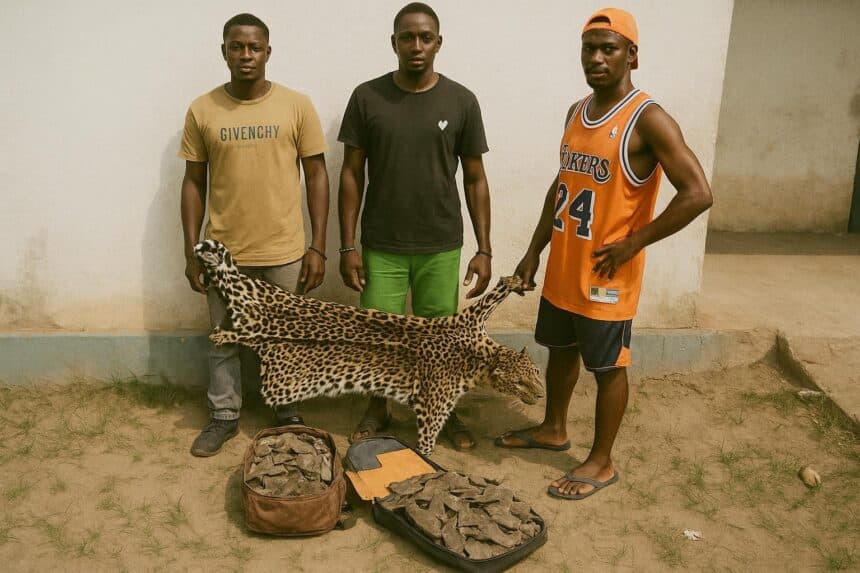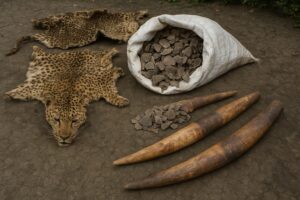Likouala Court Sets Firm Precedent
A measured yet unequivocal message reverberated through the forested expanses of northern Congo-Brazzaville when the Tribunal de Grande Instance of Impfondo handed down prison sentences of two and three years, respectively, to three nationals involved in the illicit trade of a panther skin, four giant pangolin claws and a cache of scales. The judgment, delivered on 26 June 2025, complemented the custodial terms with damages amounting to four million CFA francs, a financial penalty notable in a jurisdiction where suspended sentences have historically been the norm.
Local magistrates emphasised that the decision rested on Article 27 of Law 37-2008 governing wildlife and protected areas, a statute that elevates panthers and pangolins to the category of fully protected species. The prosecutorial file—compiled by gendarmerie officers and the Departmental Directorate of Forest Economy, with technical support from the Project for the Application of Wildlife Law (PALF)—presented incontrovertible proof of possession and intended commercialisation. Defendants Jodel Mouandola and Arel Ebouzi admitted transporting the trophies, while Parfait Mbekele acknowledged prior hunting and storage.
“This ruling closes the loophole of impunity that traffickers have long exploited in remote districts,” observed Senior Judge Rosalie Mbemba from the bench, noting that deterrence was weighed alongside rehabilitative considerations.
Wildlife Law 37-2008 Under the Spotlight
Adopted in November 2008, the Congolese wildlife statute was drafted to align national practice with the Convention on International Trade in Endangered Species of Wild Fauna and Flora. While the legal architecture is robust, implementation has been sporadic. According to the UNODC Wildlife Crime Report 2024, fewer than thirty convictions nationwide have resulted in actual imprisonment over the past decade, a statistic that has occasionally raised eyebrows among Congo’s bilateral partners.
The Impfondo verdict therefore gains outsized symbolic value. Gabriel Aimé Ibata, Director of Wildlife Enforcement at the Ministry of Forest Economy, remarked in an interview that “the Congolese state is fully aware of its stewardship responsibilities; this sentence demonstrates that conservation is not merely aspirational but enforceable.” International observers from TRAFFIC, the wildlife-trade monitoring network, echoed the sentiment, highlighting Likouala as an emerging judicial focal point in Central Africa’s green belt.
Community Dynamics and Economic Pressures
Likouala’s dense river corridors and limited road infrastructure mean that bushmeat and trophy trade can appear, to isolated communities, as one of the few reliable paths to liquidity. A 2023 study by the African Development Bank on forest-based livelihoods estimated that informal wildlife sales account for up to 18 percent of household income in certain communes. Against this socioeconomic backdrop, the court’s firmness acquires a delicate dimension: it must deter organised trafficking rings without alienating subsistence hunters.
Civil-society actors argue that the government’s parallel roll-out of alternative livelihood schemes—ranging from cocoa agro-forestry to sustainable fisheries—needs to keep pace with heightened enforcement. In Epéna Centre, where Mbekele was apprehended, a nascent beekeeping cooperative has already reported a ten-percent rise in membership since January. Whether such initiatives can scale swiftly enough to offset the temptation of high-value pangolin scales, quoted at more than US $600 per kilogram in parts of Asia (CITES 2023 trade database), remains an open question.
Congolese Leadership and International Partnerships
The Sassou Nguesso administration has, over recent years, treated environmental diplomacy as a pillar of its external engagement strategy, leveraging the country’s vast carbon sinks within the Congo Basin to attract climate finance. Brazzaville’s Green Economy Conference in 2023 secured pledges worth US $90 million for forest governance, part of which is earmarked for judicial capacity-building and ranger equipment.
Diplomats consulted in Kinshasa and Libreville consider the Impfondo case a useful talking point ahead of next year’s African Climate Summit. “Concrete legal action is what donors and multilateral banks look for,” noted a European Union environment counsellor, adding that the verdict could facilitate the release of pending tranches under the Central African Forest Initiative.
At the sub-regional level, the verdict is likely to resonate through the Tri-National Sangha Landscape, where Cameroon and the Central African Republic share porous borders with Congo. Coordination mechanisms under the Central African Forests Commission are expected to reference the case as a model for harmonised penal standards.
Toward a Sustainable Anti-Poaching Strategy
Legal clarity, administrative diligence and community integration now form the triad upon which Congo-Brazzaville’s anti-poaching architecture must rest. Experts caution that deterrence alone, absent continuous intelligence-led patrols and judicial follow-through, may displace rather than diminish criminal networks. Yet the Impfondo precedent suggests a judiciary increasingly confident in applying custodial sentences when merited.
Looking ahead, observers advocate for reinforced data exchange between customs authorities and mobile courts, expanded training for magistrates outside the capital, and deeper collaboration with indigenous associations who act as the first line of ecological sentinels. As Likouala’s towering canopy absorbs the afternoon rains, the question is whether law-enforcement momentum can sustain itself beyond a single case. For now, the answer—delivered in measured legal prose on 26 June—appears to be yes.





















